Ranking All 40 of Steven Moffat’s Doctor Who Stories – Part 4: #10 - #1
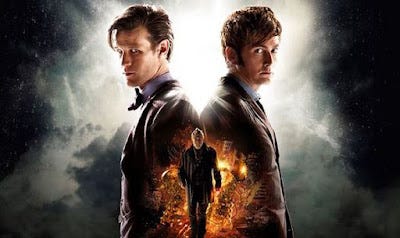
On April 3rd, 2010, a new era of Doctor Who began with “The Eleventh Hour,” and this week, that era came to an end with “Twice Upon a Time,” the Christmas Special that saw Steven Moffat, Peter Capaldi, and a whole host of other creatives from the era take a bow, handing the reigns off to Chris Chibnall and Jodie Whittaker for the show’s next, exciting step forward.
But with any change comes a chance for reflection, which is what I am doing here. Now that his final episode is out in the world, I am counting down all 40 – count ‘em, forty – Doctor Who stories Steven Moffat has contributed, as writer or, in a few rare cases, co-writer, from 2005’s “The Empty Child” to this week’s “Twice Upon a Time.” I watched every single one of these again, took extensive notes, and ranked them from least-favorite to most-favorite.
This series is also a walk down memory lane, as I have included links to my original written reviews and/or the original Weekly Stuff Podcast reviews to every episode (save some of Moffat’s earliest Russell T Davies-era stories, for which the podcast and my site did not yet exist). In some of these original reviews, you will see that my thoughts are either markedly more positive or negative than they are now, which is part of the fun of this project – I’ve been living with, writing about, talking about, and reconsidering these episodes for years now, some for nearly a decade, and trying to put a punctuation note on that progression (for now) is part of what attracted me to this project.
This list will be published in four parts, once a day through the end of the week, with each part containing 10 episodes. I hope you enjoy, and if you would like to listen to these rankings in Podcast form, we did a whole episode for that.
Be sure to catch up with Part 1, Part 2, and Part 3 if you haven’t already, and without further ado, let us conclude our journey with Part 4: #10 - #1, coming up after the jump…
10. The Day of the Doctor
Original Written Review / Original Podcast Review
Eleventh, Tenth, and War Doctor, 50th Anniversary Special; Directed by Nick Hurran
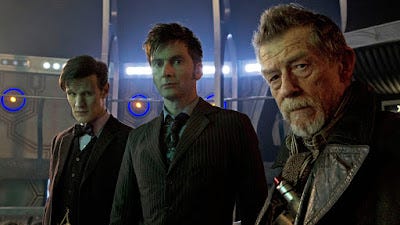
“They’re you. They’re what you become if you destroy Gallifrey. The man who regrets. And the man who forgets.”
It wouldn’t have been surprising, or even unreasonable, for Moffat and company to coast through the big 50th Anniversary Special on Matt Smith and David Tennant’s combined chemistry, to let the Doctors do the work and prioritize the more celebratory aspects over basic storytelling (it’s what “The Three Doctors,” the 10th Anniversary story and first multi-Doctor story, essentially does, fun as it may be). Moffat’s ambitions instead swung hard in the other direction, intent on telling a rich and substantive story that not only challenged multiple incarnations of the Doctor, but introduced us to an all-new one, all while confronting and reworking the most central piece of continuity in the entire modern series.
John Hurt is simply terrific as the ‘War Doctor,’ taking an idea that could have failed miserably on paper and turning him into one of the most vital, memorable guest characters the show has seen in years. David Tennant relishes the opportunity to return to his most iconic role – and Moffat’s script takes great glee in poking fun at the Tenth Doctor’s romantic, aggrandizing personality – while Matt Smith anchors the entire story with wise aplomb. And while the episode features two separate challenges for the Doctors to overcome – the Zygon invasion in London, and the last day of the Time War – it ties them together gracefully and intelligently, making the first a commentary on and impetus for the other, leading to a rousing and emotional conclusion that not only looks back across Doctor Who’s past, but helps ensure the show will have a long and robust future. “The Day of the Doctor” didn’t need to be as good or significant as it was to wish the show a happy birthday, but everyone involved so clearly poured their heart and soul into the endeavor, and the result is one of Moffat’s – and the modern series’ – finest hours, the closest we’ll probably ever get to a (proper) Doctor Who movie.
9. The Girl in the Fireplace
Tenth Doctor, Series 2; Directed by Euros Lyn
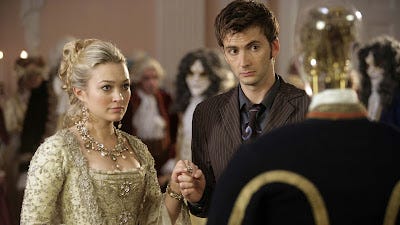
“I’m the Doctor, and I just snogged Madame de Pompadour!”
If you were to ask me what I think is Steven Moffat’s most impressive and important quality as a Doctor Who writer, I would say it his ability to write for the Doctor himself. No matter which Doctor he wrote for, whether it was one of his own creation or someone else’s – and having written for Doctors 1, 5, 8, ‘War,’ 9, 10, 11, and 12, he holds the record for writing for the most incarnations of the character – his skill at cutting straight to the heart of that particular portrayal is the foundation of many of his best stories. And “The Girl in the Fireplace” may as well be Exhibit A for that skillset, as it remains the most defining story for David Tennant’s Tenth Doctor, the episode that truly locked his character into place and identified the romantic, melancholy wavelength on which Tennant shined so brightly.
Viewed now, the episode in some ways plays as a dry run for many of the ideas Moffat would bring to the forefront during his own time as showrunner (the Doctor and Reinette’s relationship here is a clear precursor to the events of “The Eleventh Hour,” for instance), and if the episode doesn’t feel quite as fresh as it did back in 2006, I don’t think it’s lost an ounce of its charm or emotional impact. It’s an expertly paced, endlessly imaginative story, featuring a wonderful guest turn by Sophia Myles and, as noted before, perhaps the most note-perfect material David Tennant ever had to play in his three seasons on the show. And watching Tennant tear into it, all these years later, still feels like a revelation. “Blink” may be the best episode of the Tenth Doctor’s era (more on that in a bit!), but no episode showcased the character and Tennant’s incredible performance more powerfully than this.
8. The Empty Child / The Doctor Dances
Ninth Doctor, Series 1; Directed by James Hawes
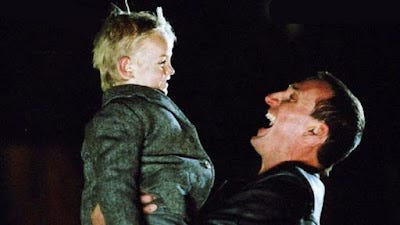
“Everybody lives, Rose! Just this once, everybody lives!”
Moffat’s very first Doctor Who story is still one of his best, an imaginative and impactful story that showcases many facets of his distinctive voice (yes, there is a ‘Doctor Who?’ pun here) and, perhaps most importantly, displays an uncannily good understanding of the show’s storytelling fundamentals. More than any other story in modern Who, this one feels like it was plucked right out of a missing season in the classic run; cut it into four parts instead of two, and it wouldn’t be hard to imagine this airing as one of the best episodes of the 1980s.
It’s an exquisite mystery where the World War II setting is so much more than just backdrop, and featuring two outstanding guest characters: Captain Jack Harkness speaks for himself, given how far John Barrowman and Russell T Davies would take the character in future episodes and the Torchwood spin-off, but I think Nancy, the young woman leading a group of orphans during the London air raids, is an equally impactful character for the purposes of this story, and the interplay between actress Florence Hoath and Christopher Eccleston forms the narrative’s strong emotional core. Eccleston, for his part, is on fire throughout these two hours, Moffat’s writing perfectly suited to his performance and ultimately giving the Ninth Doctor his most iconic moment near the story’s end. The sheer existential joy Eccleston channels into the lines quoted above is a true wonder to behold, and as short as the Ninth Doctor’s run may have been, this is one of those stories that ensures his legacy will never be forgotten.
7. Hell Bent
Twelfth Doctor, Series 9; Directed by Rachel Talalay
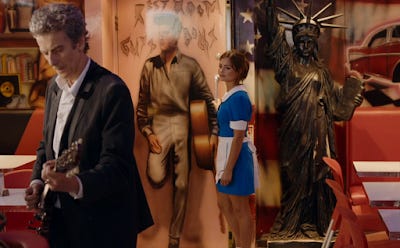
“You said memories become stories when we forget them. Maybe some of them become songs.”
Series 9, the best season of modern Who and one of, to my mind, the great seasons of 21st-century television, ultimately boils down to a story about loss, told in two incredible parts: Through a parable about the raw emotion of being lost in a prison of grief – “Heaven Sent,” which we’ll get back to in a bit – and then through this episode, “Hell Bent,” a story about the Doctor moving heaven and Earth to reverse that loss, only to learn why he shouldn’t. “Hell Bent” is, by necessity, the messier of the two episodes, yet just as smart and powerful and deeply-felt in so many ways. For from the moment Peter Capaldi starts strumming Clara’s theme on the guitar in the episode’s cold open, we know we are in good hands, and over the course of the following hour, he, Jenna Coleman, and Steven Moffat take us exactly where we need to go, even if the route isn’t the one we expect to take.
“Hell Bent” is deeply subversive in a lot of ways, promising us a big return to Gallifrey and a grand confrontation with the mythical ‘Hybrid,’ only to undermine both ideas. The Doctor has only forced his way back to Gallifrey so he can use their technology to pluck Clara from time; he no more plans to stay there long-term than he did when he first stole the TARDIS as a much younger man. And the ‘Hybrid’ is not a typical season-ending ‘big bad,’ but an intangible idea, one that may represent some unfulfilled prophecy waiting out in the Universe, or may describe Clara and the Doctor’s unique, wonderful, uplifting, yet ultimately destructive relationship: Two people, so similar in drive and empathy and passion, that the universe would have to tear them apart sooner or later.
Companions leave the Doctor all the time. But no companion was quite like Clara Oswald, no companion performance was quite like Jenna Coleman’s, and no Doctor/companion relationship was quite like that forged between Coleman and Capaldi. Clara could never just walk off into the sunset, and Capaldi could never just fly away into the TARDIS. Her leaving would force him to learn something, to challenge a fundamental part of his being, and in the end, “Hell Bent” is ultimately a complicated, layered story about how we move on from the tragedies that strike us most deeply. Watching Capaldi play a Doctor fraying apart at the seems, railing against the whole of creation itself in a poorly formulated attempt to mend his broken heart, is a terrifyingly beautiful thing – “As of this moment, I’m answerable to no one!” – and watching Coleman illustrate Clara’s growing realization at what the Doctor has gone through for her is just as achingly poignant.
It’s taken me a few years to realize the wisdom and grace of the allegory Moffat constructs for the episode’s conclusion, in which the Doctor erases Clara from his own mind. It has now been five years since my own father died, and I think about how distant he has become in my memories – not gone, but somewhat faded, the feelings I have towards him remaining while some particulars are lost to time. That’s life, and it’s what Moffat has constructed here through a sci-fi lens. Whether it’s a neural block or just the natural flow of time, the people we lose do fade, and there’s nothing we can do about that. They recede into memories, and then they become stories. As the Doctor sits at the diner, telling the Clara he doesn’t recognize about all the things they did together, I feel such a deep pang of recognition – and that’s how I know Moffat and company hit upon something profound here. Because it is deeply sad, but it is also poignant and beautiful, and that is what they capture here, in all its messy triumph and complexity.
6. Listen
Twelfth Doctor, Series 8; Directed by Douglas Mackinnon
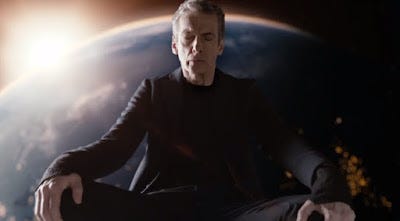
“Fear is like…a companion. A constant companion, always there. But that’s okay. Because fear can bring us together. Fear can bring you home. I’m gonna leave you something just so you’ll always remember. Fear makes companions of us all.”
In my book, “Listen” marks the official beginning of the greatest creative renaissance Doctor Who has experienced in the 21st century. Outside of the Christmas specials, this was the first time in years Moffat had written a ‘standalone’ story during a season, and in some ways, “Listen” feels like a conscious attempt to return to the level of brilliance he had displayed in the Russell T Davis years. And it would not only prove that Moffat still had his fastball, but that he had all sorts of pitches left in his back pocket he had never even hinted at before. “Listen” is an absolutely essential story in defining the darker, pricklier character of the Twelfth Doctor and Clara’s proactive, Doctor-esque personality, but is perhaps even more defining in how it lays out the storytelling fundamentals for the entire Twelfth Doctor era. It’s a much smaller, more intimate story than the kinds Moffat had been writing for Matt Smith, but it’s also quite a bit more cerebral and experimental, a sinister, strange, and open-ended narrative about a monster that very possibly only exists in the Doctor’s imagination.
It is also thematically rich in a way that would come to define Moffat’s latter years on the show, positively dense with very human themes that cut so much deeper than simple monster-of-the-week storytelling. In the end, “Listen” is a story about connections, about what we do when we’re alone, how we hide from the world, and how we come together and open ourselves to others to make those tiny, imperceptible strides towards making ourselves whole. And it’s one of the greatest hours of television Moffat, or frankly all of Doctor Who, would ever produce.
5. A Christmas Carol
Eleventh Doctor, 2010 Christmas Special; Directed by Toby Haynes
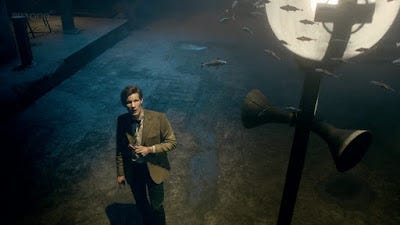
“Come on! We’re boys! And you know what boys say in the face of danger?”
“What?”
“Mummy!”
With some of the Christmas specials, whether under Moffat’s tenure or Russell T Davies’, you can sense a certain amount of fatigue, a feeling that no matter the good ideas on display, the production of the previous season didn’t leave enough time or energy to fully flesh out or polish the final product. And it is almost astonishing how fiercely A Christmas Carol bucks that trend, as it is not only one of Moffat’s absolute finest scripts, not only the Eleventh Doctor’s best and most moving episode, but one of my all-time favorite hours of television, a perennial Christmas favorite that I will likely watch and enjoy until I grow old.
Moffat’s rapid-fire comedy dialogue is at its best here, perfectly tailored to the specific energy of Matt Smith’s wonderful performance, and it’s married to a truly ingenious, emotionally perceptive twist on the Charles Dickens formula, wherein a bitter old man (played beautifully by Michael Gambon in one of the great Doctor Who guest turns) sees his past reexamined and altered before his eyes thanks to the Doctor’s intervention. It’s an episode almost impossibly full of powerful emotional crescendos, and once it reaches the music-fueled climax, it can be hard to hold back the tears. Moffat and Smith’s first year was an undeniably special one, both writer and actor clearly setting forth with something to prove, and A Christmas Carol remains, in my book, the apex of their creative collaboration, a Doctor Who story for the ages that cemented, if you were still somehow in doubt, that our favorite sci-fi series was in the best of hands.
4. Blink
Tenth Doctor, Series 3; Directed by Hettie MacDonald
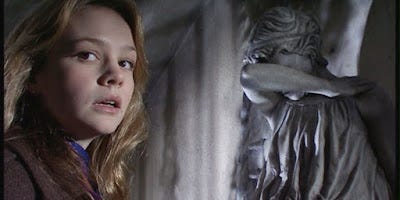
“People assume that time is a strict progression of cause to effect, but actually from a non-linear, non-subjective viewpoint – it's more like a big ball of wibbl- wobbly, timey-wimey...stuff.”
If all “Blink” did was help introduce the world to the brilliance of Carey Mulligan, then it would still be one of the best modern Doctor Who stories. But “Blink,” of course, does so much more than that. It has just about every Steven Moffat time-travel tic in the book – paradoxes, people travelling to the past and then affecting the future, events from the future somehow rippling back to affect the past, etc. – but it works better than anywhere else here because all those elements stem so organically from the ingenious villains, and the story progresses in tandem with such a compelling character journey. It is, simply put, a perfect script, one that wrangles all those potential gimmicks into a positively crackling mystery, one that never meanders and remains gripping no matter how many times one watches. It is also, all these years later, truly and deeply scary, in large part because the horror is so intellectual and experiential, getting seemingly impossible mileage out of the simple effect of statues standing still and then disappearing. “Blink” is one of those indelible classics that earns every inch of its sterling reputation; more than just a great episode of Doctor Who, it’s a damn good short film in its own right, an episode I would perennially recommend to newcomers as evidence of the series’ incredible range and the sheer creativity it has to offer.
3. The Girl Who Died
(written with Jamie Mathieson)
Twelfth Doctor, Series 9; Directed by Ed Bazalgette

“I’m sick of losing people. Look at you, with your eyes. Your never-giving-up. Your anger. Your kindness. And one day, the memory of that will hurt so much that I won’t be able to breathe, and I’ll do what I always do. I’ll get in my box and I’ll run, and I’ll run. In case all the pain ever catches up. In every place I go, it will be there.”
“The Girl Who Died” is at once among the best classic-style, straightforward Doctor Who stories ever told – with a wonderful guest cast, an imaginative central threat, a terrific use of setting, and a fun, fitting climax – and one of the great deconstructions of those stories. The deconstruction is bubbling underneath the surface the whole time, as a disarmingly vulnerable Doctor seems more self-aware than usual about how stories like these tend to go, but explodes in a volcano of grief and fury after Ashildr (Maisie Williams, who throughout this season does the best work of her young career) dies unexpectedly in the Doctor’s clever plan. The sequence quoted above, where the Doctor admits to Clara and, more importantly, to himself that he’s so sick of doing this – day after day, century upon century, winning the war but losing the battle – is a stunner, beautifully performed by Capaldi and Coleman. The subsequent revelation about why the Doctor ‘chose’ this current face – a moment that could have gone either way for me on paper, but which is executed so well and in such perfect context that it feels essential – is a moment so rousing and astonishing that it never fails to send chills down my spine.
As good as the storytelling here is, and as rich as the thematic tapestry it weaves turns out to be, “The Girl Who Died” ultimately ranks this highly for me on strength of its dialogue and performances. The writing throughout this episode is disarmingly thoughtful and gorgeously constructed, from the Doctor’s nighttime conversation with Ashildr about storytelling and being different – “I know I’m strange. Everyone knows I’m strange. But here I’m loved. You tell me to run, to save my life. I tell you that leaving this place would be death itself” – to the Doctor translating baby speak, a joke from the Matt Smith era that becomes hauntingly beautiful here: “Mother, I hear thunder. Mother, I hear shouting. You’re my world but I hear other worlds now. Beyond the unfolding of your smile, is there other kindness? I’m afraid. Will they be kind? The sky is crying now, the fire in the water.” And then of course there is the final stretch, which includes the monologue quoted above, a moment of sheer vulnerability unlike anything we had seen on Doctor Who up to that point.
As with all of these ‘co-written’ episodes, it is impossible to know who wrote what, and given that Jamie Mathieson was perhaps the best writer of the Capaldi era – he was to Moffat’s run what Moffat was to Russell T Davies’ – I suspect it was a fairly close collaboration. But “The Girl Who Died” foreshadows so much of what would make Series 9 so special, and feels like such a fully realized version of the kind of meta-storytelling Moffat liked to partake in, that it’s another one that has to be spoken of when discussing Moffat’s finest hours as a writer. And there are few finer hours in the history of Doctor Who than “The Girl Who Died.”
2. World Enough and Time /
The Doctor Falls
Original Podcast Review – Part 1 / Part 2
Twelfth Doctor, Series 10; Directed by Rachel Talalay
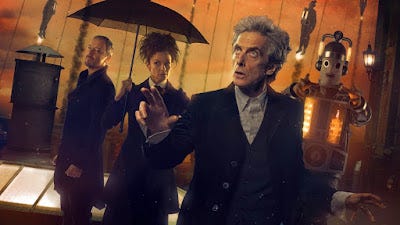
“What would you die for? Who I am is where I stand, where I stand…is where I fall.”
Like “The Girl Who Died,” but on a much grander scale, the two-part finale to Series 10 is both a singularly great Doctor Who story and a singularly intelligent and soulful story about why Doctor Who – both character and show – endure. It’s a story that has many things going on: A spaceship so big and so close to a black hole that time dilates inside, two incarnations of the Master who may or may not be working towards the same end, a companion who is nearly killed and then transformed into something terrifying, and a bevy of people in front of and behind the scenes for whom this is either their last or penultimate Doctor Who story ever: Steven Moffat, Peter Capaldi, Pearl Mackie, Matt Lucas, Michelle Gomez, composer Murray Gold, director Rachel Talalay, etc. And yet, with so many things to juggle, the episode ultimately funnels itself into a story that is, especially for a Doctor Who finale, aggressively small scale: A life-or-death struggle not to save the Universe, but to get a small settlement of people from one level of a doomed spaceship to another, buying time for the next fight.
And that is precisely why this story is so powerful. It is a concentrated, distilled version of what Doctor Who, character and show, is all about: Helping people as much as one can, as long as one can, whenever the call is heard. In that regard, this story is one of the purest tests the Doctor has ever faced, and watching the exquisite Peter Capaldi play a Doctor struggling to determine and actualize what he believes at his most fundamental core is such a powerful thing behold that, for me, it goes beyond words. The last 30 minutes or so of “The Doctor Falls” is a cascade of emotional breaking points, from the Master and Missy’s final moments, to the Doctor’s last stand in the woods (where he quotes the Fourth Doctor’s “No, not a Doctor, THE Doctor”) and “No stars” elegy, to Bill’s unexpected salvation and the Doctor railing against fate and his own regeneration. Just writing brief descriptions of these moments, my heart aches remembering them. And in listing them all, I am neglecting the brilliance of “World Enough and Time,” which is a great episode in its own right, featuring some of the best horror writing and direction in the history of the series, and an outstanding performance from Pearl Mackie.
But in the end, I think it’s best just to let “The Doctor Falls” speak for itself, and present the speech that not only beautifully defines this all-time great story, but also the character of the Doctor, in all his (and soon to be her) many lives and incarnations:
“Winning? Is that what you think it’s about? I’m not trying to win. I’m not doing this because I want to beat someone, or because I hate someone, or because I want to blame someone. It’s not because it’s fun. God knows it’s not because it’s easy. It’s not even because it works because it hardly ever does. I do what I do because it’s right! Because it’s decent! And above all, it’s kind! It’s just that…just kind. If I run away today, good people will die. If I stand and fight, some of them might live. Maybe not many, maybe not for long. Hey, you know, maybe there’s no point to any of this at all. But it’s the best I can do. So I’m going to do it. And I will stand here doing it until it kills me. And you’re going to die too! Some day. And how will that be? Have you thought about it? What would you die for? Who I am is where I stand, where I stand…is where I fall. Stand with me. These people are terrified. Maybe we can help a little. Why not, just at the end, just be kind?”
1. Heaven Sent
Original Written Review / Original Podcast Review
Twelfth Doctor, Series 9; Directed by Rachel Talalay
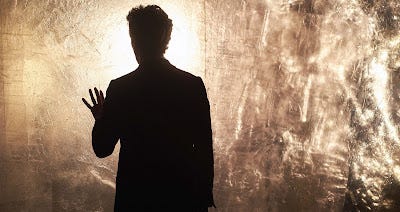
“Personally, I think that’s a hell of a bird.”
Two years ago, on the night “Heaven Sent” first aired, I wrote the following:
When I first opened my computer to type up some notes after watching “Heaven Sent,” every inch of my heart and mind pummeled by the experience, I found myself unsure of where to even begin. There is a lot to praise here, obviously, but even if one’s instinct is to jump straight into hyperbole, where does one start? You want to bow at the altar of Peter Capaldi, of course, because the work he does here, almost entirely on his own and with more pages of dialogue in one hour than most actors get in full seasons, is positively transcendent. But then, those words in his mouth are the work of Steven Moffat, who has imagined such a powerful and provocative scenario here, and realized it in such beautifully poetic fashion. But the words and the performance don’t get to live and breathe the way they do without director Rachel Talalay, who turns in what is quite probably the best-directed episode of Doctor Who in its 52 years of existence, a visual powerhouse that is paced and edited to perfection. But Talalay’s images and staging don’t come alive the way they do without composer Murray Gold, who after a decade spent scoring this series delivers his best single-episode work to date in an episode that is arguably driven every bit as much by music as it is by Capaldi’s performance. And really, when you stand back and consider it all, you realize that as much as “Heaven Sent” looks like a one-hander on the surface, it is ultimately a testament to the collaborative spirit of filmmaking, to the creative heights that can be achieved when a group of artists give their all in service of a meaningful story.
And I think that’s a pretty good description, and I’m happy with how that entire review (linked above) has held up over the last two years. But what that review cannot capture is how the episode has lived inside me ever since it aired, has proven one of those works of art I think about all the time, that has become one of those standards I think to when considering creativity, or thematic intent, or how one writes characters, or how a single performance can leave such an immense impact, or how one can capture complex emotions in an elegant narrative framework. It’s an episode that has helped me understand the process of grief – my own and that of others – in presenting such a concentrated, empathetic allegory for what it feels like to fight through some intangible internal pain every day after the wound is opened. And it is, of course, an episode that defines what this crazy show I love so much can do when it is operating at the absolute height of its powers, for few episodes demonstrate as clearly and profoundly as “Heaven Sent” how Doctor Who can go anywhere, be anything, and pull off any idea, no matter how insane or ambitious, so long as those involved have enough passion and skill to go the distance.
To call “Heaven Sent” the best episode Steven Moffat has ever written feels obvious; to call it the best episode of the modern series seems like an understatement. It is a great and significant work of 21st-century visual art, one of the great episodes of television ever assembled, the centerpiece of an all-time great TV season that also stands on its own as an astonishing feat of filmmaking. My depth of praise for this episode is bottomless. There were a lot of fun, interesting challenges involved in assembling this list, but deciding what would take this #1 spot was never in question. If “Heaven Sent” were the only episode of Doctor Who Steven Moffat ever wrote, it would still be a hell of a legacy. Put it at the top of this extraordinary pile, so dense with truly great episodes, and it’s clear to see that viewers will be talking about his work for as long as people watch and discuss Doctor Who.
Follow author Jonathan Lack on Twitter.

